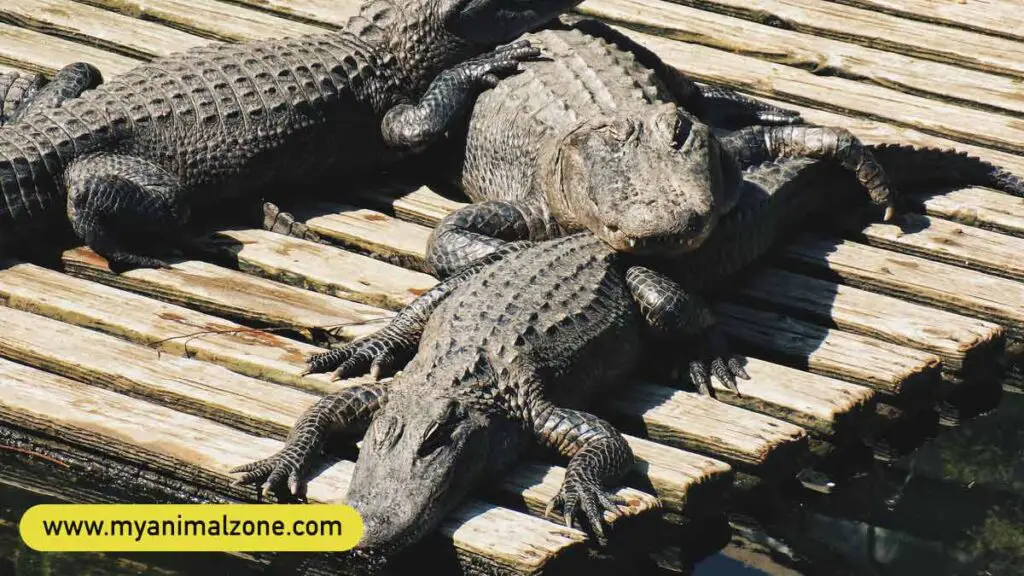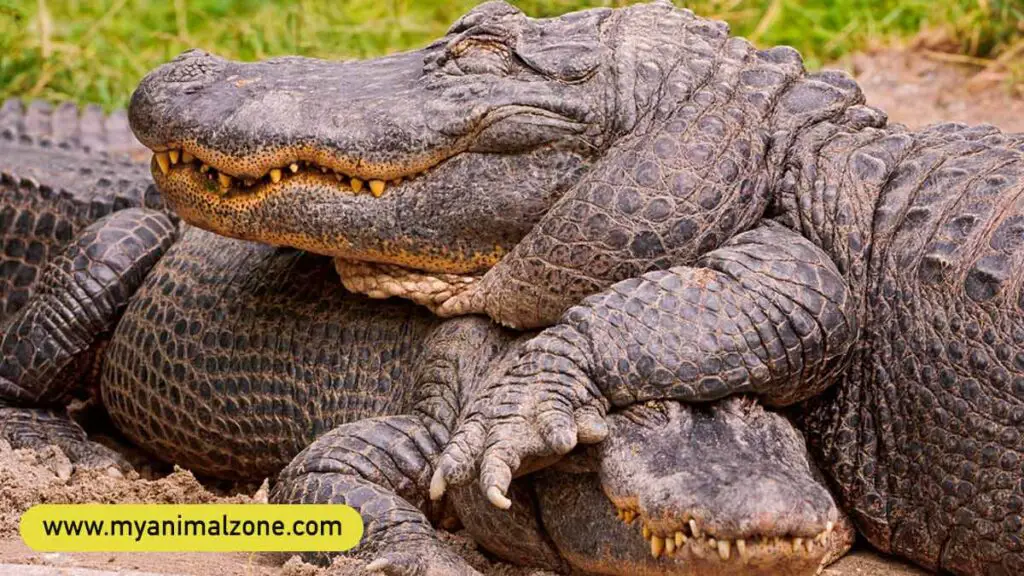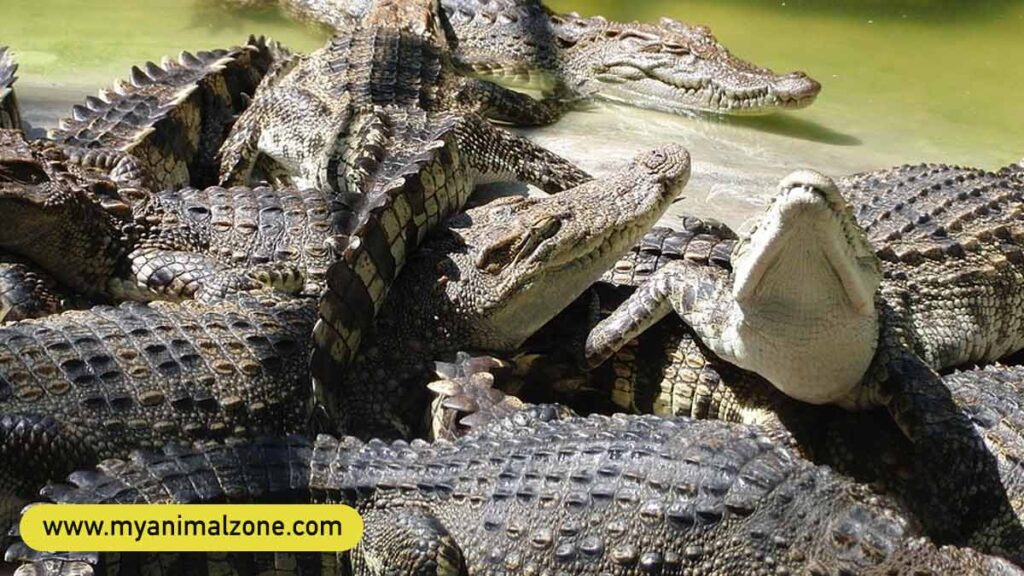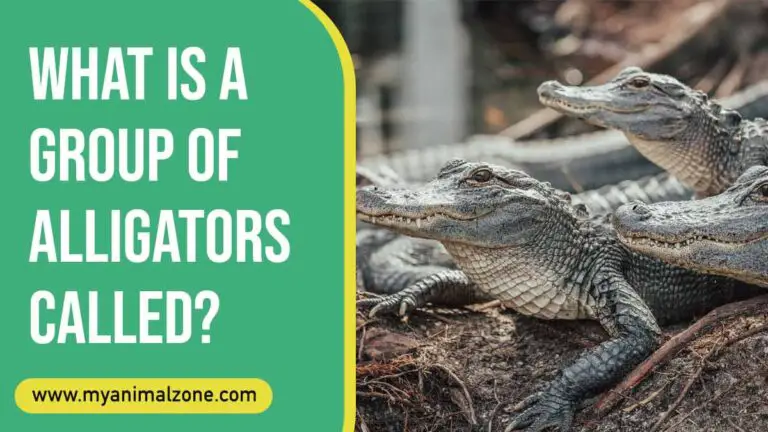Alligators are fascinating creatures on Earth. But, by mistake, people often call them crocodiles. It’s true in some way.
Alligators are a type of crocodilian, an order of giant reptiles that includes crocodiles, alligators, caimans, and gharials.
The snout shape is what sets alligators apart from crocodiles. Alligators have a broader snout with rounded ends. In contrast, crocodiles have a longer, narrower snouts than alligators.
Alligators are native to the southeast United States and China. In the United States, you can find alligators in Florida, Louisiana, Georgia, South Carolina, and Mississippi.
But what do we call a group of alligators? This question has stumped many people, but it’s pretty simple.
So, what do you call a group of alligators? A group of alligators is called a ‘congregation.’ The word means a group of people or animals who have gathered together. Typically, this term refers to a group of wild animals.
In addition, it describes a group of people who are gathering for worship or religious activities. So, if you see a group of all, you can call it a ‘congregation.’
Hopefully, now you know what a group of alligators is called. Now you’re probably wondering why alligators form a group. And the same time, you might have a question; what can I call a group of baby alligators, or is there a different name for it?
Keep reading to find out!
What Is A Group Of Baby Alligators Called?
A group of baby alligators is called a pod, while a group of adult alligators is called a congregation. Baby alligators are called hatchlings; a female alligator can lay 20 to 50 eggs at a time.
Mother alligators and mother crocodiles are fierce protectors who hold eggs in their mouths when they sense their eggs are about to hatch. The mother helps the hatching process by moving the eggs around her mouth until they hatch.
Once the eggs hatch, the mother alligator digs down to the nest and carries her young to the water. Mother alligators take care of their babies and teach them how to survive during the first to two years of their lives.
When babies stay in a pod, mothers can easily watch them and protect their young. After that, she leaves them to fend for themselves.
It takes baby alligators about two to three years to leave the mother’s side and become independent. However, the mother alligator protects smaller alligators from predators if necessary.

Reasons Why Alligators Form A Group
Alligators are social animals and often stay in groups because it’s safer. The following are a few reasons why alligators form a group:
Defending Against Predators
Alligators form the group to protect each other against predators. Hippopotamuses can hurt both crocodiles and alligators.
When they stay together, it’s harder for predators to attack them. Alligators may also attack and kill predators if they feel threatened. They can use their tail to defend themselves.
Basking
Another reason why alligators form a group is to get warmth from the sun. Alligators and crocodiles are cold-blooded animals, which means they rely on external heat sources to regulate their body temperature.
Basking in the sun is a natural way for them to gain warmth. When they stay in groups, it’s easier to find a sunny spot and get warm. You can often see crocodiles and alligators basking together in the mud.
Hunting
Alligators also form a group to hunt prey and can surround and catch their prey more quickly when they work together.
It is common to see groups of alligators and crocodiles hidden in the water. Usually, they do this when their prey gets close and attack them.
Depending on the situation, they may attack individually or as a group. In this way, alligators can hunt more easily and quickly because their prey can barely escape death.

What Is The Collective Noun For A Group Of Alligators?
The collective noun for a group of alligators is Congregation. The collective noun ‘congregation’ means a group of people or animals who have gathered together.
This word refers to those who gather together for religious worship or are members of a particular church. Interestingly, it also describes a group of animals, people, or other things or beings.
Some Different Names for Groups of Alligators
Most people do not know that the correct word for alligators is ‘congregation.’ Thus they often use different names for a group of alligators.
The following are some other names or collective nouns that people use for a group of alligators:
Family Of Alligators
The word itself suggests that there are many alligators somewhere. People use it more often than ‘congregation’ as it is easy to remember and pronounce. For example, the term ‘family of alligators’ refers to a group of alligators related to each other, including parents, children, and siblings.
Bask of alligators
The word bask indicates a group of crocodiles, but some people use it for a group of alligators. Bask meaning is to be exposed to the warmth of the sun. The two animals can be found basking in the sun in groups. That’s because crocodiles and alligators belong to the same family Crocodilia.
Crocodiles and alligators are cold-blooded animals, so they need external heat sources like basking in the sun to regulate their body temperature.
Gang of Alligators
The word gang typically refers to a group of people or criminals. As alligators are dangerous and meat-eating animals, people also use gangs for them, which also means a group of people or animals of the same species or the same nature.
Den of Alligators
The word den is mainly used for a group of snakes as they stay in a hole or someplace hidden. But people also use it for the alligator population as they hide in the water and attack their prey.
The coterie of alligators
Coterie means a group of people sharing the same thoughts and ideas. People can also use this word for agroup of crocodiles as they share the same habitat and live together.

Do All Alligators Congregate?
No, not all alligators congregate. Adult females and young alligators (both young males and young females) often gather together. This group behavior allows them to benefit from each other’s company.
In contrast, large numbers of male alligators tend to live alone in their territories. Adult males do not want any company and seek out places where they can find solace. Once they find a suitable location, they will protect their territory from all other animals, including other alligators. Defense alligators are apex predators in the world.
The only time adult male alligators congregate with others (female alligators) is during mating season. At this time, they come together to find a mate and reproduce. Outside the mating season, alligator males spend most of their time alone.
Read More
- The Link Between Birds and Dinosaurs: Uncovering the Closest Connection
- Do brood parasites build nests?
- What are the three bird clades?
- What are the evolutionary patterns of birds?
- What is the phylogeny of birds?
Do Crocodiles And Alligators Congregate?
No, both alligators and crocodiles do not congregate in groups. That’s because these two animals often live in different parts of the world.
Crocodiles live in Africa, Asia, and Australia, while Alligators are typically found in America. As a result, it is not usual for crocodiles and alligators to congregate in the same place.
The Florida Everglades is the only place where you can find both crocodiles and alligators sharing space. Usually, it’s a mix of males and females with their young.
However, they do not always assemble because Nile crocodiles are more territorial; their groups typically consist of one dominant male, several females, and their young babies.

Conclusion
I hope this blog post has helped you know what to call an alligator’s group. Now you will not be confused about what word to use for a group of alligators.
With this knowledge of what alligators are called, you can impress your friends with this fun fact the next time you see a group of all!
While alligators are fascinating creatures, it’s important to remember that they’re wild animals. If you see a group of alligators, don’t approach them. Instead, enjoy watching them from a safe distance!
Do you have any other name for a group of alligators? Please share with us in the comment section below. We would love to hear from you.




